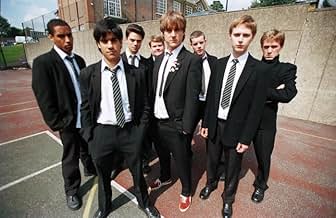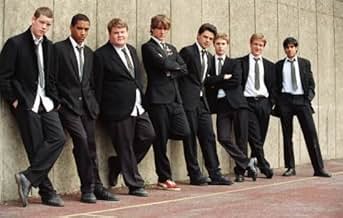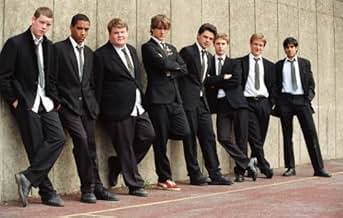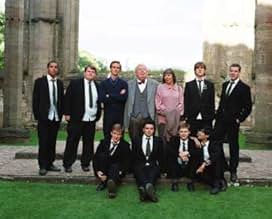Eine widerspenstige Klasse begabter und charmanter Teenager wird von zwei exzentrischen und innovativen Lehrern unterrichtet, während ihr Schulleiter darauf drängt, dass sie alle in Oxford o... Alles lesenEine widerspenstige Klasse begabter und charmanter Teenager wird von zwei exzentrischen und innovativen Lehrern unterrichtet, während ihr Schulleiter darauf drängt, dass sie alle in Oxford oder Cambridge aufgenommen werden.Eine widerspenstige Klasse begabter und charmanter Teenager wird von zwei exzentrischen und innovativen Lehrern unterrichtet, während ihr Schulleiter darauf drängt, dass sie alle in Oxford oder Cambridge aufgenommen werden.
- Nominiert für 2 BAFTA Awards
- 2 Gewinne & 15 Nominierungen insgesamt
Empfohlene Bewertungen
The above quote from the athletic, anti-intellectual Rudge in Alan Bennett's London and Broadway hit, The History Boys, is the antithesis of the high-minded quotes and philosophies spouted by teachers and aspiring "Oxbridge" scholars at a public grammar school in Yorkshire. Yet the quote epitomizes the sub-textual disdain for intellectual snobbery and solipsism that hangs about academic institutions anywhere, anytime.
History can be an accumulation of facts that have power in their reality ("This is Oxford and Cambridge. You don't just need to know it backwards. Facts. Facts. Facts."). Or it can be a set of insights into the human condition whose power derives from the understanding one extracts from them ("All knowledge is precious whether or not it serves the slightest human use."). This film reveals the tension between those poles of learning and the in-between state of wisdom.
It's 1983 in a boys' public grammar in Yorkshire as the gifted "history boys" prepare for their "Oxbridge" exams for entrance to Oxford or Cambridge. The months before the exams will put them in hyper drive as the results-oriented headmaster vies with the portly sensibility teacher, Hector, who believes more in the experience of education than the quantifiable outcomes. Memorized lines from Keats or learning French by acting out a scene in a brothel is his preferred mode.
The latent and sometimes overt homosexuality, not a stranger to boys' school, is handled as just another learning experience for boys and teachers, at least those couple of teachers such a Hector who are known to prefer boys. The sexual orientation is as much figurative for decisions that must be made and the experience that will bring understanding of life's unpredictability, not just historical facts. The acceptance and casualness of the issue stretches credulity, but not as metaphor.
The transition to film from stage is no always smooth: Some scenes are played directly into the camera; others are static, less fluid on screen than under the proscenium arch. But who cares with all that inspired dialogue? If you love to hear English as it was meant to be spoken, albeit highly stylized, and young people grappling with big ideas, see The History Boys.
Apart from the boys, the two main characters are two of their teachers. Hector, an elderly man approaching retirement, is the general studies teacher whose role is to give the boys some general cultural background. He has a deep love of learning and believes strongly in the value of knowledge for its own sake. He has, however, become something of a figure of fun to the boys, partly because of his portly figure and his occasionally eccentric teaching style, but mostly because he is a homosexual (although trapped in an unhappy marriage), given to fondling his pupils, especially when giving them a lift on his motorcycle.
Irwin is a young history specialist brought in by the school to coach the boys for this examination. Unlike Hector, who has a deep reverence for truth as an absolute value, Irwin takes the Pontius Pilate line, "what is truth?", and encourages the boys to question received ideas about history. Like Hector, he too is homosexual, and becomes involved with Dakin, one of the boys. Dakin, who is bisexual, is also having an affair with Fiona, the headmaster's attractive secretary; another boy, Posner, who is just realising that he is gay, has an unrequited crush on Dakin.
Bennett's play was recently used by A A Gill, the left-wing TV critic of the "Sunday Times", as a stick with which to beat conservative historians. (He was thinking of the likes of Niall Ferguson, Andrew Roberts and David Starkey). He compared their revisionist approach to history to that of Irwin which he saw as intellectually dishonest, mere contrarianism for the sake of stirring up controversy (and publicity). That seemed to me, however, to be a misinterpretation. Bennett was not criticising historians who seek to re-evaluate the past rather than simply repeating traditional received ideas. Irwin may not be interested in truth for its own sake, but his approach to history is advocated less as a method of philosophical inquiry than as an exam-passing technique, his argument being that a deliberately controversial approach is more likely to impress Oxbridge dons jaded from marking too many papers. (In any case, some of Irwin's ideas- such as the claim that the Allies as well as the Germans were to blame for the outbreak of World War One- would not have been particularly controversial among historians in the eighties).
The film has been criticised for its homosexual themes, some reviewers going so far as to attack Bennett for allegedly defending paedophilia, which strikes me as another misconception. The boys in this film would all be aged eighteen or nineteen, and therefore of the age of consent, even for homosexual acts. The issue which Bennett raises is not "Is paedophilia defensible?", but "Are sexual relationships appropriate between teachers and pupils, regardless of age?", and his answer appears to be "no". Hector's penchant for fondling his pupils has, despite his gifts as a teacher, led to his becoming a laughing-stock and diminished his authority among the boys. Bennett certainly concentrates on homosexuality (apart from the Dakin-Fiona affair, there is surprisingly little- for a film about teenage boys- mention of heterosexual relationships), but it must be remembered that he is himself gay and, like most writers, concentrates on those issues which are most important in his own life. The film would doubtless be very different, and possibly more popular with heterosexual audiences, if the scriptwriter had been heterosexual. It would, however, be unfortunate if audiences allowed themselves to be dissuaded from seeing the film.
I felt that Bennett raised some potentially interesting themes which he did not pursue, such as the female teacher's feminist comments about the role of women in history and the discussion about whether the Holocaust is a subject that can be studied by historians like any other, but it seems to me that the film was not so much a film of ideas as a study in personalities and relationships. Richard Griffiths was very good as Hector, bringing out both sides of his personality. On the surface Hector is a larger-than-life, jovial character, ever ready for a laugh with the boys, but beneath that surface he is a sensitive, often unhappy, man. I also liked Stephen Campbell Moore's cynical but also vulnerable Irwin and Clive Merrison's pompous, autocratic headmaster (even if he was a bit of a caricature). The boys mostly emerged as distinct personalities in their own right- the handsome, cocksure Dakin, the shy, tormented Posner, the hearty sportsman Rudge, and so on.
The other thing I liked about the film was that, in spite of some serious themes and a tragic denouement, it is often brilliantly funny. Like a number of other reviewers I was particularly struck by the scene, played all in French without subtitles, where Hector gets the boys to act out a scene in a brothel and then (when the headmaster unexpectedly enters) tries to pretend that they were re-enacting a scene from a wartime hospital! There are also some perceptive one-liners, from Hector Irwin and the boys, such as the paradoxical, but often true, observation that the best way to forget something is to commemorate it. This is a film with much to enjoy, quite apart from the pleasures of nostalgia. (I attended a grammar school very similar to this one in the late seventies before going to Cambridge). 7/10.
About a group of young British Oxford and Cambridge hopefuls who are being trained by their teachers to achieve this goal, "History Boys" is a film portraying young people at school that is the farthest thing from American, and that's a good thing. No characters fall into obvious stereotypes and they are all highly intelligent, gifted individuals. The boys aren't being educated to be smart, they're being challenged in their thinking and subsequently being challenged as people.
The subplot and controversy of the film is an incident involving misconduct between a student and the boys' primary teacher, Hector, played by Richard Griffiths who is most famous for his role as Uncle Vernon in the Harry Potter series. Homosexuality or the questioning of sexuality and sexual drives and the desire to please others that one is fond of (in the broadest sense) is a major undertone and many times a player in the film's events. It's a bit confusing, but it adds something more material to a film that often times seems to be footage of well-read individuals discussing literature. Anyone who is turned off by scholarly behavior and thought could not possibly enjoy this film because they'd feel bored and alienated.
The actors, all men mostly, are superb in the film, but Frances De La Tour while a definite supporting character carries her own power on the screen. The acting and characters are really the most important element of this film. It takes not time to establish its characters and relationships-you have to see them develop and insinuate them based on character interactions throughout the film. Since the film is mostly talking, there is a lot of opportunity for that.
While the viewer does feel very much on the outside of the plot, the actors and characters do tend to keep the interest level up and the ending is very nice and effective. The result is something much more meaningful and not nearly as gimmicky as the title "The History Boys" suggests.
Wusstest du schon
- WissenswertesThe cast for this movie are the same cast who appeared in the original play at the National Theatre in London, England.
- PatzerLockwood was killed in action with the York and Lancaster Regiment. They were disbanded in 1968.
- Zitate
Hector: The best moments in reading are when you come across something - a thought, a feeling, a way of looking at things - that you'd thought special, particular to you. And here it is, set down by someone else, a person you've never met, maybe even someone long dead. And it's as if a hand has come out, and taken yours.
- Crazy CreditsAt the beginning of the film, the title - "The History Boys" - is taken letter by letter from random parts of an essay on the dissolution of the monasteries, a common history topic, which the History Boys themselves write later on in the film.
- SoundtracksL'Accordéoniste
Music by Michel Emer
Lyrics by Michel Emer
© 1945 S.E.M.I., France / Peer Music (U.K.), Ltd., London
Performed by Samuel Barnett & Jamie Parker
Top-Auswahl
- How long is The History Boys?Powered by Alexa
Details
- Erscheinungsdatum
- Herkunftsländer
- Offizieller Standort
- Sprache
- Auch bekannt als
- The History Boys
- Drehorte
- Produktionsfirmen
- Weitere beteiligte Unternehmen bei IMDbPro anzeigen
Box Office
- Budget
- 2.000.000 £ (geschätzt)
- Bruttoertrag in den USA und Kanada
- 2.706.659 $
- Eröffnungswochenende in den USA und in Kanada
- 100.803 $
- 26. Nov. 2006
- Weltweiter Bruttoertrag
- 13.407.101 $
- Laufzeit1 Stunde 49 Minuten
- Farbe
- Sound-Mix
- Seitenverhältnis
- 1.85 : 1
Zu dieser Seite beitragen






































